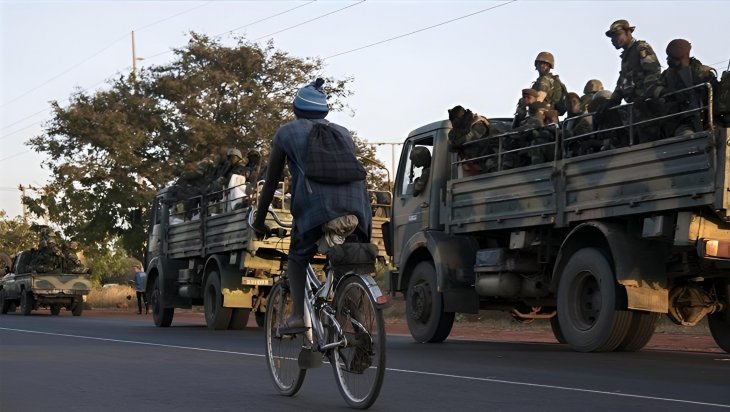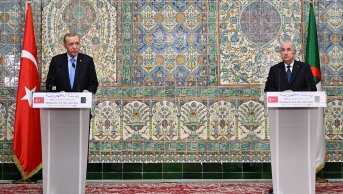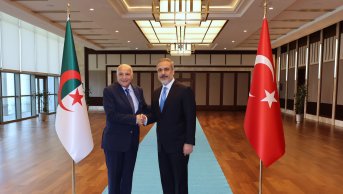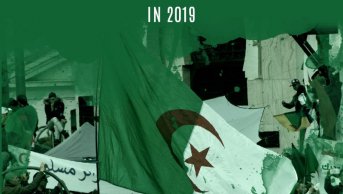How is France’s African Sahel Surrealpolitik Upsetting Algeria?

The ongoing political struggle in Niger, following the military coup against ousted President Mohammed Bazoum is the consequence of France’s recent surrealpolitik in the African Sahel and West Africa foreign policy. In 2013, President Hollande's justification for his act-of-war in Mali was “freeing the Malian people from al-Qae’eda."
Does the African Sahel become the new great game?
Usually, military coups in the tumultuous region of the African Sahel are really no-events. Yet this one is making the entire region and its non-African players, regional powers and superpowers show a great deal of interest and intention towards such a complex matter of local power struggles between tribal and ethnic religious and political actors. On this stance, France that is the usual suspect of the region malaise and coups’ disease, is very active and worried about the domino effect of the trajectory of the coups that are challenging its military and diplomatic prestige that the latter is in fact in decline since the fiasco of Serval and Berkhane operations in Mali, not to mention France’s Libya policy from President Sarkozy to President Macron, where their lack of experience of world affairs did affect their bad decisions, enhancing an anti-French sentiment across the continent, and giving the birth of Neo-Pan Africanism led by a new generation of military and political elite, and civil society leaders who are raising awareness against France’s patronage and hegemony.
Thus, this patronage attitude has been demonstrated by the position of the sub-regional organization of ECOWAS, an organization that gathers fifteen countries and was created in 1975 to improve economic cooperation within the western African countries; nonetheless, the population in this sub-volatile region sees it as irrelevant and a minion in the hands of Paris. Notably, when the leader of ECOWAS, the newly elected Nigerian president, threatened the new military authorities in Niamey with a military operation.
Such an irresponsible act that would burn the entire region, with countless consequences, would create a serious security vacuum, a complicated humanitarian crisis, and permanent political chaos. All these national security factors did oblige Algeria to react and clash with France over the Niger crisis. Algiers looks at these series of coups in the region as the result of Paris’s arrogant narcissism. Foreign policy in the region is still driven by the colonial comportment and micromanaging of its allies, which continues to create friction and delusion.
A proxy war played into colonial power
Hence, the scenario of the military intervention aimed at restoring legitimacy in Niamey will be acted upon by the Economic Community of West African States (ECOWAS), in an implicit option for Paris to punish the new military authorities in Niamey who dared to question France’s colonial power in Niger and in the region in general; however, Algiers disagrees with such an operation because of its consequences. Algiers’ entire land borders are either on fire or on high tension, opening a war front on its southern borders will be a turning point, a doctrine shift in Algeria’s military doctrine that has the legal frame that was put in place in the 2020 amended constitution in its article 91-2.
Algeria is closely monitoring the situation as it is concerned about what is happening in its southern neighbor country for many considerations. It hastened to warn of the consequences of foreign military intervention in Niger, but without giving up on its main demand that has been expressed since the first hours of the coup, which is the return to the constitutional order and respect of the rule of law.
The Algerian government reaffirms its support for ousted President Mohamed Bazoum as the legitimate President of the Republic of Niger. “The return to the constitutional order should be achieved through peaceful means that would protect brotherly Niger and the region as a whole from an escalation of insecurity and stability and our people from more tribulations and tragedies.” It also calls for caution and restraint in the face of foreign military intervention intentions. As a result, these options are not excluded and can be resorted to, but they only represent factors that complicate and increase the seriousness of the current crisis.
French interests in Niger were targeted by local protests supporting the coup as the French embassy was attacked, and they raised slogans calling for an end to French presence in their country, noting that Paris had deported about 1,500 soldiers from neighboring Mali and Burkina Faso to Niger. A country is a major source of nuclear facilities in terms of the uranium supply of France’s facilities. Algeria's warning of military intervention in Niger came to be distinguished from the French position, which was characterized by much ambiguity after the statement issued by the Elysee Palace after protests stormed the French embassy in Niamey, which threatened to protect its citizens and interests.
The last base standing
Two positions are not matching by all means; Paris knows well that if it loses Niger, it means the end of influence and dictate in the region; as a result, other regional and superpowers will fill its long influence zones’ sphere and domination; countries like Russia and China are already gaining full support of the population; and the U.S. has been playing a low profile, knowing that it is holding on to its powerful military base in Niger and special forces across the turbulence of the Sahel. Türkiye has been vocal and has positioned itself in the region as a trustworthy partner and a stabilizing force in West and East Africa.
Algeria, however, adheres in fact to the condition of the return of constitutional legitimacy to Niger, but France seems to be playing a double game, leaving the ECOWAS to act on itself — sending the wrong message of an endless war. Algeria has all the cards in its hand, starting with the armed terrorist groups that Algiers masters in this dossier and adding the migrant’s card that it could use to let thousands of migrants cross its long desert to Europe. This is why France’s and the U.E.’s leaders should think twice about any military operation in Niger. The repercussions will be worse than Libya’s in this case, the entire region will implode. The security and humanitarian ramifications of the two Generals’ war in Sudan are already showing their impacts on Algeria, and Libya is crossing from Chad to Niger, moving up to the north African countries.
Therefore, Paris should review its tactics in Niger and work closely with Algiers in terms of good coordination between their respective Intelligence services and military cooperation to fight the dystopian groups in the Sahel, drogue and weapons trafficking, and migrant smugglers across the harsh Sahel. Paris could side with Algiers and help with any mediation and reconciliation process on the horizon. Algeria has solid experience, for instance, in the Algerian Reconciliation Charter launched by President Liamine Zeroual in 1996 and achieved by the late President Abdelaziz Bouteflika in 2000, in which Chadian authorities and other leaders of African Sahel countries are taking Algeria’s political Reconciliation Charter as a model for peace and reconciliation processes.
A strategy the authorities in Algeria have been using to marginalize the radical discourse used by radical Islamist groups, a political sentiment that provides the implementation of the moderate religious discourse, is called: al-Wasatia.
In sum, political reconciliation needs brave politicians and leaders to take a position that goes with a posture that sets reliable partners on a cohesive stage that fortifies the political frame put in place in any reconciliation talks process, not to support friendly tyrants like Paris has been supporting in Egypt, Libya (Haftar), Tunisia, and Chad.










